On the Pastoral Care of Divorced and Remarried Persons
Preface
His Excellency Archbishop Tarcisio Bertone
Introduction
His Eminence Cardinal Joseph Ratzinger
The Reception of Holy Communion by the Divorced and Remarried Members of the Faithful
Apostolic Exhortation Familiaris Consortio, no. 84 Address of His Holiness John Paul II to Participants in the XIII Plenary Assembly of the Pontifical Council for the Family
Commentaries and Studies
D. TettamanziM.F. PompeddaA. Rodrguez Luo
P.G. MarcuzziG. Pelland
Libreria Editrice Vaticana
United States Conference of Catholic Bishops
Washington, DC
Contents
Fidelity in the Truth
Dionigi Tettamanzi
Canonical Problems
Mario Francesco Pompedda
Can Epikeia Be Used in the Pastoral Care of the Divorced and Remarried Faithful?
Angel Rodriguez Luo
The Application of Aequitas et Epikeia to the Divorced and Remarried
Fr. Piero Giorgio Marcuzzi, SDB
The Practice of the Ancient Church Relative to the Divorced and Remarried Faithful
Gilles Pelland, SJ
Preface
The present volume, a Supplement for Pastors, was expressly requested by the Supreme Pontiff John Paul II in order to offer the bishops and priests an aid in the difficult question of the pastoral accompaniment of divorced and remarried faithful.
The book presents again some significant recent statements of the Magisterium: (1) the Letter to the Bishops of the Catholic Church Concerning the Reception of Holy Communion by the Divorced and Remarried Members of the Faithful, made public by the Congregation for the Doctrine of the Faith on September 14, 1994, with the approval and at the direction of the Supreme Pontiff; (2) no. 84 of the Apostolic Exhortation Familiaris Consortio of John Paul II, the fruit of the 1980 synod of bishops published on November 22, 1981; (3) the address that, on January 24, 1997, the Holy Father addressed to the participants in the thirteenth plenary assembly of the Pontifical Council for the Family.
These texts are preceded by an introduction signed by His Eminence Cardinal Joseph Ratzinger, prefect of the Congregation for the Doctrine of the Faith. It describes the historical context of the publication of the aforementioned documents, and their essential contents. It also summarizes the main objections raised with regard to the doctrine and discipline in this area and proposes the means of responding to these objections that have emerged from an in-depth study on the part of the appropriate offices of the same congregation.
This is followed by two articles of commentary, published in LOsservatore Romano, that illustrate some fundamental aspects of the 1994 documents. The articles are by His Eminence Cardinal Dionigi Tettamanzi, archbishop of Genoa, Fidelity in the Truth (cf. LOsservatore Romano of October 15, 1994), and by His Excellency Mario F. Pompedda, dean of the Roman Rota, Canonical Problems (cf. LOsservatore Romano of November 18, 1994).
Finally, three recent studies are reported that have the aim of exploring certain particularly difficult problems. These are the theological-moral essay by Professor Angel Rodriguez Luo, Can Epikeia Be Used in the Pastoral Care of the Divorced and Remarried Faithful? (cf. LOsservatore Romano of November 26, 1997), the study by Fr. Piero G. Marcuzzi, SDB, The Application of Aequitas et Epikeia to the Divorced and Remarried (cf. LOsservatore Romano of November 29, 1997), and the patristic contribution of Fr. Gilles Pelland, SJ, The Practice of the Ancient Church Relative to the Divorced and Remarried Faithful.
I sincerely hope that the publication of this supplement may be of assistance to all those who are involved with this issue, and in particular to those involved in the area of pastoral care for the divorced and remarried faithful.
 Tarcisio Bertone
Tarcisio Bertone
Secretary
Introduction
Marriage and the family are of decisive importance for a positive development of the Church and of society. The eras in which marriage and the family have flourished have also always been times of well-being for humanity. If marriage and the family go into crisis, this has significant consequences for spouses and their children, but also for the state and the Church. It is evident to all that the upheavals and cultural changes of the century just ended have not spared even marital and family life. Of course, signs of hope are also emerging in this important area of existence. But on the whole, in many countries marriage and the family find themselves in a profound crisis. One of the many symptoms of this is the growing number of those who are divorcing and contracting a new civil bond.
The question of which path should be followed in the pastoral accompaniment of such persons is today a matter of lively discussion in the Church. However, difficulties in pastoral care for the family are nothing new. The Church has encountered them since the time of the apostles. The Fathers of the Church were concerned about resolving problems as they emerged case by case; in this regard they naturally drew upon the teaching of Jesus on the indissolubility of marriage while at the same time seeking, without trivializing the Word of Jesus, to take into account individual situations that were often very complex. In the second Christian millennium in the West, the problems connected to marriage were further clarified and regulated on the level of ecclesiastical teaching and law. The Orthodox Churches emphasized the principle of oikonomia, or a benevolent attitude in difficult individual cases, which among other things led to a gradual weakening of the principle of akribia, or fidelity to revealed truth.
In recent decades divorces, which are generally followed by a new civil union, have increased at a dizzying pace. For this reason, the Church felt the duty to reflect anew and to clarify a few magisterial, canonical, and pastoral principles in this regard. These introductory reflections cannot examine in an exhaustive manner a topic that has so many aspects, nor above all can they enter into the many problems that are implied, as in the further development of the doctrine on marriage on the basis of Vatican Council II. Their only aim is to (1) describe briefly the context of the most recent pronouncements of the Magisterium, (2) summarize the essential content of the doctrine of the Church on this topic, and (3) revisit a few objections against this doctrine, indicating the direction of a response.
I. The Context of the New Magisterial Pronouncements
1. Vatican Council II deepened the teaching of the Church on marriage and the family and presented it in a more personalistic perspective (cf. Gaudium et Spes, nos. 47-52). Because of the conciliar preference for proclaiming the truth positively, there was less mention of the difficulties and problems. The questions relative to the divorced and remarried faithful were not expressly raised by the council fathers, and therefore they found no room in the conciliar documents. Nor, at the time, did they have the relevance that they have today. Nonetheless, the council teaches that divorce undermines the dignity of marriage and the family (cf. ibid., no. 47) and cannot be reconciled with marital love (cf. ibid., no. 49).
2. Already at the end of the eighteenth century, in some countries divorce was introduced as a legal possibility into state legislation; by the 1960s and 1970s, it was sanctioned in civil law in almost all the states with a majority Catholic population. As a result, a growing number of the Catholic faithful have also asked for divorce and for the most part have contracted a new bond, naturally without a celebration in church. According to the 1917 Code of Canon Law, such faithful were considered as ipso facto infames (c. 2356) and publice indigni (c. 855 1). Because they were living in sin, they were not only excluded from the sacrament of Confession and of the Eucharist but were also considered as publicly disgraced.

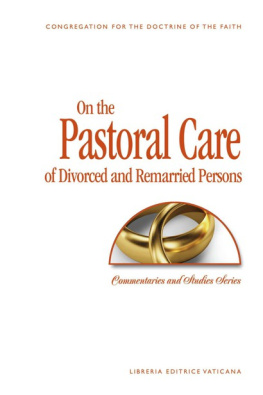
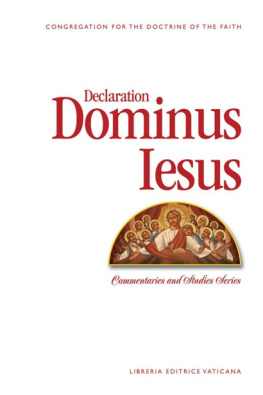
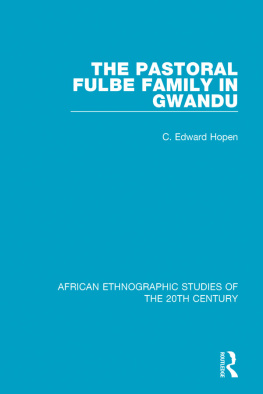
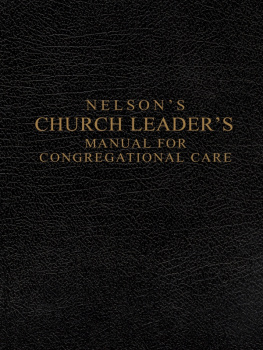
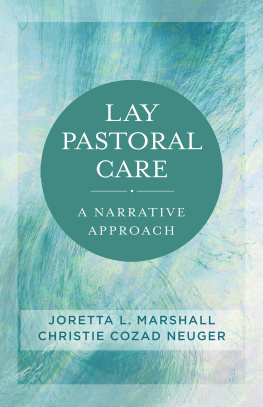


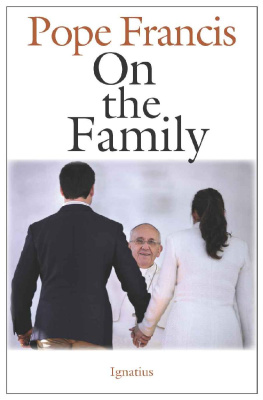
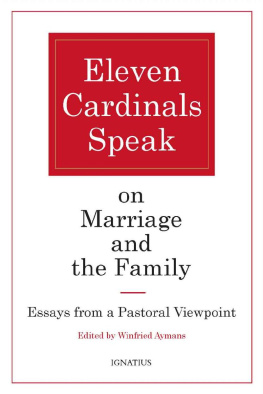
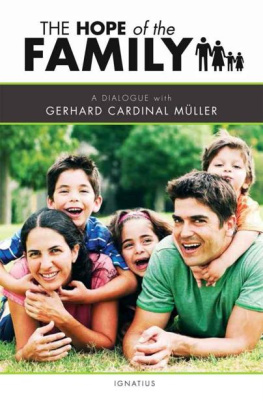
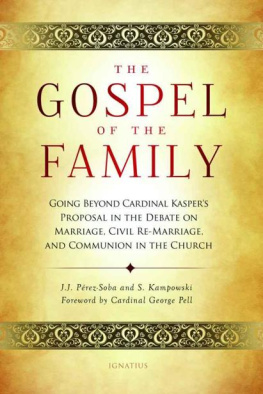
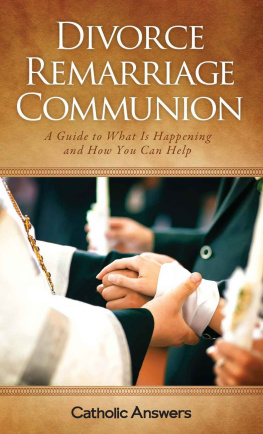
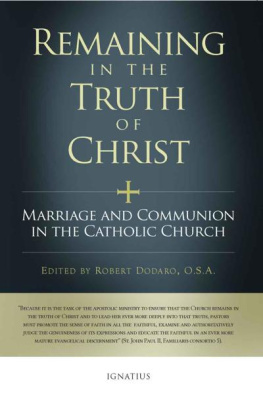
 Tarcisio Bertone
Tarcisio Bertone